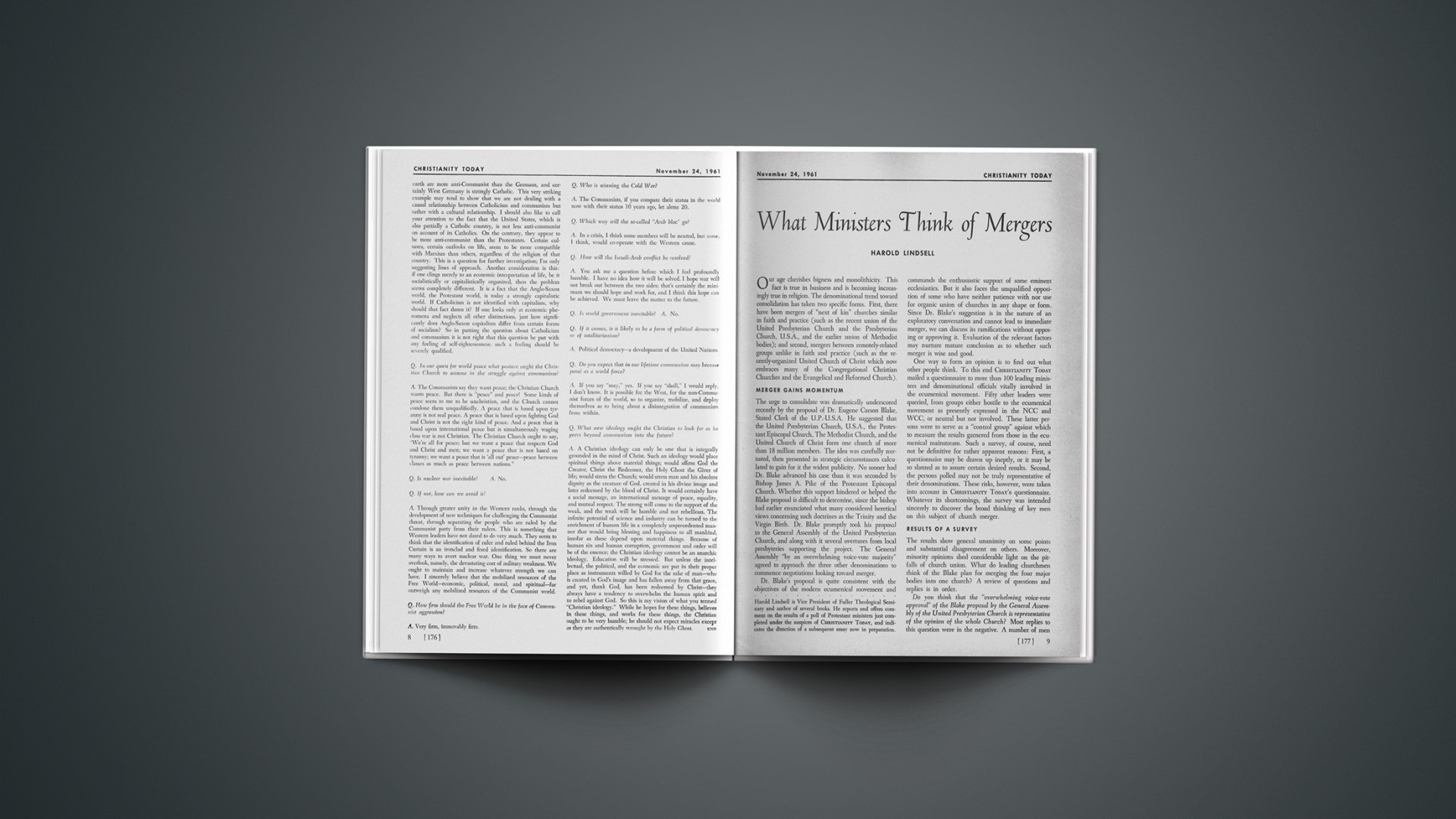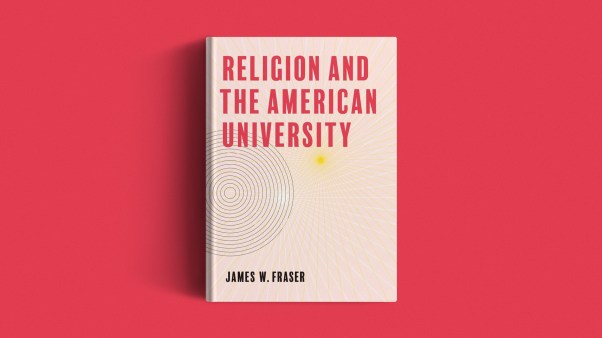Our age cherishes bigness and monolithicity. This fact is true in business and is becoming increasingly true in religion. The denominational trend toward consolidation has taken two specific forms. First, there have been mergers of “next of kin” churches similar in faith and practice (such as the recent union of the United Presbyterian Church and the Presbyterian Church, U.S.A., and the earlier union of Methodist bodies); and second, mergers between remotely-related groups unlike in faith and practice (such as the recently-organized United Church of Christ which now embraces many of the Congregational Christian Churches and the Evangelical and Reformed Church).
Merger Gains Momentum
The urge to consolidate was dramatically underscored recently by the proposal of Dr. Eugene Carson Blake, Stated Clerk of the U.P.-U.S.A. He suggested that the United Presbyterian Church, U.S.A., the Protestant Episcopal Church, The Methodist Church, and the United Church of Christ form one church of more than 18 million members. The idea was carefully nurtured, then presented in strategic circumstances calculated to gain for it the widest publicity. No sooner had Dr. Blake advanced his case than it was seconded by Bishop James A. Pike of the Protestant Episcopal Church. Whether this support hindered or helped the Blake proposal is difficult to determine, since the bishop had earlier enunciated what many considered heretical views concerning such doctrines as the Trinity and the Virgin Birth. Dr. Blake promptly took his proposal to the General Assembly of the United Presbyterian Church, and along with it several overtures from local presbyteries supporting the project. The General Assembly “by an overwhelming voice-vote majority” agreed to approach the three other denominations to commence negotiations looking toward merger.
Dr. Blake’s proposal is quite consistent with the objectives of the modern ecumenical movement and commands the enthusiastic support of some eminent ecclesiastics. But it also faces the unqualified opposition of some who have neither patience with nor use for organic union of churches in any shape or form. Since Dr. Blake’s suggestion is in the nature of an exploratory conversation and cannot lead to immediate merger, we can discuss its ramifications without opposing or approving it. Evaluation of the relevant factors may nurture mature conclusion as to whether such merger is wise and good.
One way to form an opinion is to find out what other people think. To this end CHRISTIANITY TODAY mailed a questionnaire to more than 100 leading ministers and denominational officials vitally involved in the ecumenical movement. Fifty other leaders were queried, from groups either hostile to the ecumenical movement as presently expressed in the NCC and WCC, or neutral but not involved. These latter persons were to serve as a “control group” against which to measure the results garnered from those in the ecumenical mainstream. Such a survey, of course, need not be definitive for rather apparent reasons: First, a questionnaire may be drawn up ineptly, or it may be so slanted as to assure certain desired results. Second, the persons polled may not be truly representative of their denominations. These risks, however, were taken into account in CHRISTIANITY TODAY’S questionnaire. Whatever its shortcomings, the survey was intended sincerely to discover the broad thinking of key men on this subject of church merger.
Results Of A Survey
The results show general unanimity on some points and substantial disagreement on others. Moreover, minority opinions shed considerable light on the pitfalls of church union. What do leading churchmen think of the Blake plan for merging the four major bodies into one church? A review of questions and replies is in order.
Do you think that the “overwhelming voice-vote approval” of the Blake proposal by the General Assembly of the United Presbyterian Church is representative of the opinion of the whole Church? Most replies to this question were in the negative. A number of men indicated they did not know, or had doubts, or were unconcerned because they are not Presbyterians. It was rightly pointed out by several that approval by the General Assembly was not a vote to endorse merger but simply to “study” and to “confer” on the question. Some felt that the vote was a fair reflection of what the church wants; others considered the whole affair as ecclesiastically contrived by a small number of clergymen and denominational leaders. One Presbyterian thought that the General Assembly’s affirmative vote was secured only because the proposal was a motion “to pursue” the possibility of merger, and not a motion approving merger with specific terms and conditions.
Unity And Creed
One matter evinced complete unanimity. The question Do you feel that the essential message of the Church, based on biblical revelation, should be played down for the sake of ecclesiastical unity? brought not a single affirmative reply. This response clearly suggests that no church union of lasting value can be based upon a defective message. It is the writer’s opinion that, should there be a merger ultimately, any accompanying creedal formulation would not expressly violate the historic message of the Church. Debate is more like to center in what should be omitted than in what should be included. Like the World Council of Churches, whose minimum statement leaves room for vast differences of opinion on questions like the Virgin Birth, the physical Resurrection, and the Atonement, the creedal basis of the projected new church could be equally broad. On the other hand, the problem of message could conceivably be solved by using the Anglican Thirty-nine Articles, the Westminster Confession of Faith, the Methodist Articles of Religion, or a combination of all of them. To adopt one of these, however, still would not solve the acute problem that right now plagues some denominations which already have satisfactory creedal affirmations, namely, how to eliminate those who do not believe the present creeds.
Half of those polled thought it possible to conserve in a great united church those essential Christian doctrines and convictions that have always characterized a strong Christian witness. Many others added qualifying statements. Some thought it “possible but not probable.” Others thought such a united church would be similar to what churches already are, that is, mixed in theological perspective, some more conservative, some less, and some liberal and neo-orthodox. Some felt that bigness makes conservation of essential doctrine and conviction impossible while others thought that size is of no consequence here. “It seems that ‘unity’ always demands the widest latitude in doctrinal statement, with a resulting thinness that says very little,” was one comment. Another said, “The presuppositions are not valid. Size and strength of conviction are not mutually exclusive as the question indicates.”
Faith And Order
Protestant Episcopal and Lutheran sources particularly objected to any bifurcation of message and organization. They argued that faith and order are inseparable; one does not exclude the other. Most respondents, however, understood the question the way it was intended. They replied that the message is of greater import than the organization since it is possible to have an organization without a message. A true message will get through to men even though the organization is defective.
In connection with these questions on faith and order a most significant fact emerged. Several bishops in the Protestant Episcopal Church asserted that no union should occur which is not based on an acceptance of the historic episcopate. Thus one wrote, “… if there is any question of union, it seems to me that it has to be based on the presupposition that what we want is re-union not just union.… It seems to me that this is the only way in which we can proceed, otherwise we end up with a Pan-Protestantism on the one side and various forms of Catholicism on the other, and this is not re-union. I think we ought to deal with this fact in the very beginning because certainly if we don’t, later on there is going to be trouble.” A recent editorial in The American Church Quarterly plainly spelled out this idea by stating, “The episcopate is organic to the Church.” This same editorial argued for re-union not union; for catholic re-union not ecumenical re-union. Therefore if Episcopalians insist upon the historic episcopate as an essential element of union this insistence spells either death of the union under consideration or acceptance of Episcopalian terms by the United Presbyterian Church and the United Church of Christ, with the Methodists already in the fold of episcopacy.
On The Road To Rome?
Two questions looked beyond the union inherent in the Blake-Pike proposal: Do you think the unity Christ prayed for can be secured, or necessarily must be secured, through mergers leading to one visible Church? and Is unity to be equated with structural and organizational forms such as that expressed in the unity of the one Roman Catholic church? The replies were almost all negative. The implications here are plain enough. While these answers do not speak against church mergers, their opposition to the idea of one church is evident. Moreover, the respondents believe genuine unity is possible apart from one church.
The few who considered visible oneness essential said: “I doubt if the unity Christ prayed for will ever be achieved by the denominational divisions we now have.” “General and complete fulfillment of Christ’s prayer would be more clearly visible to the world through one visible church.” “Yes, Christ prayed for visible unity that the world may believe.” “I believe that the type of unity Christ prayed for would result in such mergers. It will not necessarily be secured by them.” “We must take the prayer seriously and work toward oneness. Ecclesiastical barriers do not make for sharing of love or life in Christ our common Lord.” Opponents pungently said: “I think that the use of that verse in John 17 as a proof text for this coerced unity is a grotesque perversion of Scripture. The exegesis which comes to such an interpretation is shallow and shoddy.” “I find nothing in John 17 which would indicate that Christ had in mind ecclesiasticism, but rather a spiritual unity which is not directly related to, or dependent on, visible organization.”
Again looking toward the future, CHRISTIANITY TODAY asked if the proposed merger could be interpreted as a movement aimed ultimately at rapprochement with the Roman Catholic church. Answers were about evenly divided.
The great majority felt that such a merger would indeed dilute or destroy the historic distinctives of the combining denominations. They also thought the loss of their own distinctives would be unfortunate; very few would regard that loss with indifference.
The proposed union raises questions about ecclesiasticism. It was asked, therefore, if such union would lead to greater central authority and power at the expense of grass roots participation in the work of the Church. A great majority said “Yes.” This, of course, is not to say that union would necessarily be either good or bad. The response does reflect, however, the expectation that union would lead to a centralization of power and authority; controlled by fewer individuals, the Church would become more monolithic. Some feared that the people in such a united church would tend to occupy a position somewhat similar to the Roman Catholic laity who have neither voice nor vote in the operations of their local parishes or in what Rome does and says; others took an opposite view. One churchman said, “It might conceivably mean more ‘local’ autonomy—that depends on many factors.” Another replied, “More local initiative and diversity may be possible in the larger church where different traditions would forward their own seminaries and emphases.” Still another felt that “there would be more centralization. The ‘grass roots’ would also gain new areas of witness.” Another replied, “No. If the denominations involved in such a merger remain true to the best in their heritage there should be no danger of this. However, it is a present-day danger in the ‘organization church’ even within denominations.” Some elaborated their fears. One said, “There is no question about this coming to pass. Our own church is a classic example of this very thing, with a heavy-handed hierarchy of a few chairborne soldiers bossing the whole army.” One Presbyterian replied, “Yes. It has already done so in the United Presbyterian Church.” Another respondent felt that “it would substitute for the voice of Christ speaking by his Spirit through the Word (Bible) the voice of the ecclesiastical organization.”
The Hesitant Laity
CHRISTIANITY TODAY also tried to discover the minister’s impression of the layman’s idea about mergers by asking Do you think that the lay people of your church are anxious for a merger of this (the Blake) type? About 90 per cent who answered the question said “no.” Others qualified their answers. One stated that his denomination is divided on this issue. Another said, “The University students, those who are thinking and reading and circulating among people, are anxious for a change. The Committed Core are hesitant.” Another added, “I think laymen in the majority have become disenchanted with the rigid denominational lines. The proof of this is the frequent crossing of denominational boundaries.” In this vein one said, “Probably the majority do not care, because we are in a day when most people join a church, not for convictions, but for convenience.” One respondent believed that Episcopalians, except those trained in the Anglo-Catholic parishes, are in favor of merger. One answer whose larger overtones cannot be expanded here was, “Few are in favor of merger, but isn’t this beside the point? Does not the church exist to aid people to see and to be what they ought to see and be?” His reply suggested that most of those who disapprove of merger simply need to be educated in favor of merger. The auxiliary question What per cent of your people are in favor of merger? elicited 10 per cent or less as the most usual answer. Two estimated 60 per cent, another 50 per cent, five 25 per cent, several 20 per cent, and a number replied “negligible,” “scant,” “low,” “very few,” “indifferent,” “small,” “don’t know any.”
Controlled Literature
Denominational literature is a strategic area of witness. Of the denominations included in the Blake proposal none has been attacked more severely for its church school literature than The Methodist Church. Critics have deplored its literature as in the main theologically liberal, and politically and economically leftist. Therefore those polled in the questionnaire were asked if the literature of the proposed church would represent the highest and the best in each tradition or the lowest common denominator on which all could agree. Several respondents said the question appeared “loaded.” A substantial majority thought the literature would most likely be pitched at the lowest common denominator rather than being representative of the best and highest in each denomination. Some suggested the policy would depend entirely upon the editors and their efforts, on the terms of the merger, and on what the leadership thought best for the people. Others thought a merged church might have different curricula available to various elements within the church. One felt the Presbyterians stood to lose rather than to gain. One churchman commented that the lowest common denominator idea “has long ago been abandoned by all leaders of the ecumenical movement.” Another, in a similar vein, said, “I think, for example, of the study booklet of the World Council of Churches on ‘Christ the Light of the World.’ I don’t think this bears out the oft-expressed prediction of watered-down witness. But the danger is there—certainly.” Contrariwise, another wrote that “This has been one of the most sensitive spots in our own experience. Evangelical Christianity has been sabotaged many times in the literature of our denomination. Suave, sophisticated agnostics have been secured as authors, and rebuttal has been eliminated by ‘lack of space’ or ‘limitations of an editorial schedule.’ ” The survey indicates that literature apparently will be a controversial topic in any merger, and that many fingers will probe this issue if merger talks proceed seriously.
Are Denominations Wicked?
The division of the Church of Jesus Christ into denominations has often been called a scandal and a sin. The poll included a question that checked reactions to such an idea. About 85 per cent of those polled do not regard denominations as a scandal and a sin. Important qualifications were added by some respondents. Several stated that while denominations per se are not sinful some divisions are sinful because they came about for basically unsound reasons and were occasioned by questionable motives. However, divisions truly aimed at preserving the true Christian faith are justifiable, they said. Those which perpetuate “outworn human creedalisms, traditions, national and sectional prejudices, and encourage ecclesiastical rivalries, prides and ambitions” are wrong, however. Where “human traditions and viewpoints are absolutized” division is sin, said one. In favor of union, one argued that, “the biblical unity is oneness in Christ but this is to be manifest in life. Just try and explain divisions to a non-Christian. I think the most cogent reason for union is evangelistic to demonstrate we are one.” Another explained that “divisiveness, not division, is sin. Unfortunately, denominational separateness and exclusiveness are good breeders of the divisive spirit.” Still another called divisions a stumbling block; “… to be happy with this seems to me to be a sin. We should seek to arrive at greater unity, eliminating barriers and division when this can be done without sacrificing convictions or doctrinal truth.” Others argued that denominationalism has some excellent benefits and is in the plan of God. “There was only one door into the Ark,” said one, “but there were several rooms.” Another wrote that “the body has hands and feet. It’s the relationship to the one and only head of the Church (Jesus Christ) that is important.” And another stated that denominations are “a historic development resulting from the earnest endeavors of conscientious men to know and express Christian truth. It is unfortunate, but not a scandal or a sin.” The replies indicate it will be unfruitful to argue for merger on the ground that present divisions are sinful until a much greater number of people are convinced that they really are.
The foregoing summaries represent replies from prominent denominational churchmen whose churches are deeply implicated in the ecumenical movement. As previously noted, 50 other church leaders outside the ecumenical movement were surveyed as a “control group” to test the replies from ecumenical sources. On the whole, the answers of the control group paralleled the other. The differences between groups were at the level of percentages rather than at the level of basic conviction. Thus if 80 per cent of the first group responded affirmatively to a question, the control group normally responded with a higher percentage. But findings indicate no startling differences even in the most strategic areas of investigation.
Conclusions From The Survey
This poll suggests the following conclusions: 1. The message of the Church is considered essential in any merger; 2. the merger impetus comes largely from high level ecclesiastical sources and not from the grass roots of either clergy or laity; 3. while Christians are gravely interested in Christian unity, there is no general consensus of what true unity is or how it can be implemented; 4. the pathway to merger has many pitfalls and very substantial roadblocks; 5. many who have grave reservations concerning merger remain to be convinced that the Blake proposal is the real answer to disunity.
Since Dr. Blake has proposed a plan he believes will solve disunity among the churches, we should certainly examine the situation further. First, we should study the reasons that favor organic union and by investigating those mergers already consummated discover whether they have accomplished their objectives. Second, we should offer some guidelines of those methods whereby unity has already been sought and delineate what we consider a sound solution to the problem of unity. To these questions we shall address a forthcoming essay.










